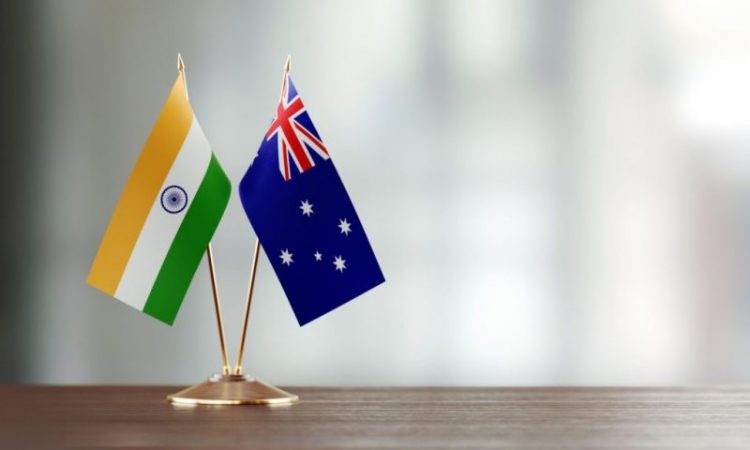India – Australia Relations – Common threats in cyber security, the way forward

Context: Clear evidence of the changing world order and the countries not have taken off their eyes from the Indo-Pacific have been manifested by the signing of the India-Australia Economic Cooperation and Trade Agreement in goods and services (ECTA) earlier this month. This has happened while the western world and media were focusing majorly on the conflict between Russia and Ukraine.

This topic of “India – Australia Relations – Common threats in cyber security, the way forward” is important from the perspective of the UPSC IAS Examination, which falls under General Studies Portion.
How does the recent engagement of India and Australia set a concrete example?
- The botched US withdrawal from Afghanistan followed by China taking a serious interest in creating new economic, military and political alliances, and the impending energy crisis demand that nations recalibrate their strategic as well as long-term interests.
- The India-Australia ECTA is a concrete example of the bilateral faith in common values, and understanding of threats and goals. A reflection of this is cooperation in cyber security.
Why an immediate cooperation in cyber security is required?
Lessons from the Russia-Ukraine conflict:
- The Russia-Ukraine conflict has shown how cyber threat actors, both state and non-state, have become significant players in hybrid or “unrestricted” warfare.
- Both countries have let loose malicious elements in the information as well as operational space, while non-state actors like the hacktivist group Anonymous claimed to have caused significant damage to critical Russian and Belarusian financial and military infrastructure.
The China factor:
- China is accused of having amassed a large number of cyber weapons and has allegedly carried out sophisticated operations aimed at espionage, theft of intellectual property, and destructive attacks on internet resources of some countries.
- Australia and India have been at the receiving end of several such campaigns by the so-called Advanced Persistent Threat (APT) groups, supported by or assumed to be located in China.
Efforts that have been taken by both the countries to fulfil the cooperation
Comprehensive Strategic Partnership:
- Indian PM and his counterpart, the Australian PM elevated the bilateral relationship to a Comprehensive Strategic Partnership in the virtual bilateral summit held in June 2020.
New cyber security framework:
- The new cyber framework includes a five-year plan to work together on the digital economy, cybersecurity and critical and emerging technologies.
Bilateral research and regional cyber resilience:
- The new cyber security framework will be supported by a $9.7 million fund for bilateral research to improve regional cyber resilience.
Cyber Policy Dialogue and Joint Working Groups:
- An annual Cyber Policy Dialogue, a new Joint Working Group on Cyber Security Cooperation and a joint working group on ICTs have been established.
- Also, an annual India-Australia Foreign Ministers Cyber Framework Dialogue will be held.
Inclusion of India in the International Cyber Engagement Strategy:
- The International Cyber Engagement Strategy began in 2017 to actively conduct capacity-building arrangements in Indonesia, Singapore and Thailand, and support similar activities in Malaysia, Vietnam and Cambodia.
- It is a core Australian initiative.
- In 2021 Australia added critical technologies to the initiative, making it important to the bilateral partnership with India and to the Quad.
- India will now be included in it.
A joint Centre of Excellence to set up:
- A joint Centre of Excellence for Critical and Emerging Technology Policy, to be located in Bengaluru, will be set up as decided by both the countries in February this year.
India’s efforts to increase its cyber security
- India has set up the office of the National Cybersecurity Coordinator, a national Computer Emergency Response Team (CERT-IN), a national Critical Information Infrastructure Protection Agency (NCIIPC), and made appropriate amendments to the Information Technology Act and Rules to enhance its cyber security posture.
- This has upped India’s rank to 10th in the Global Cyber Security Index (GCI) 2020, from 47th just two years earlier.
- India has capable cybersecurity professionals.
Way forward
- India and Australia share common concerns around 5G rollouts, threats by APT groups, cybercrime, information warfare and threats to a democratic order.
- Deepening cooperation can develop avenues for mutual learning and create complementary markets in cyber tools and technologies, boosting bilateral business and strategic commitments on both continents.
Practice Question for Mains
- Discuss how the common concerns that India and Australia share around cyber security can be resolved by deepening the cooperation between the two. (250 Words, 15 Marks).

